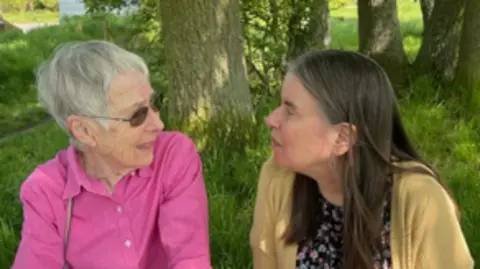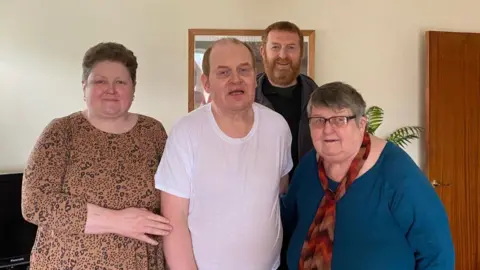Home for autistic adults to close after 50 years
 Nick Sugden
Nick SugdenIt was thought to have been the first residential campus for autistic adults in the world, certainly in the UK, when it opened in 1974.
Now Somerset Court is being closed and sold by the National Autistic Society (NAS).
NAS said it was in the "best interests" of the people it supports, and the buildings at the Somerset site had "reached the limit of how much they could be improved".
Christine Lushington moved to Somerset Court nearly 50 years ago at the age of 13, and last week she was one of the last residents to leave.
"We thought it was going to be her home for life," said her sister, Nikki.
The closure has prompted mixed feelings among the families of those who have made Somerset Court their home.
The property was bought in the 1970s by a group of parents who wanted to provide a suitable home for their autistic children after leaving school.
Over the course of 50 years Somerset Court developed into a series of bungalows and other buildings in the grounds of the large, white manor house.
In 2016 one of the homes, Mendip House, was closed after safeguarding concerns.
By 2020, 35 autistic adults were living at Somerset Court in six houses.
And that is when the announcement was made that the whole campus would be closing.

Matthew Sugden, who is autistic and a person of restricted growth, moved to Somerset Court in 2000 when he was 19.
When the closure plans were announced it "caused a lot of anxiety" and his father Nick said the family "had a bit of a fight on their hands" to ensure Matthew remained living in the county.
Three years ago Matthew, 43, moved into supported living in nearby Brean, in a house owned by the National Autistic Society.
He is supported by staff who used to work at Somerset Court, alongside another former resident.
"Every Sunday evening he and his fellow housemate go to the Iron Duke in Burnham for karaoke night - not to take part, but they like the noise that people make," Nick Sugden said.
The NAS said it thinks autistic people experience "better wellbeing and more satisfying lives" in supported living.
Nick Sugden said it had been a "learning curve for everybody" but that Matthew is enjoying having more choice, for example planning his menu for the week and going food shopping with staff - compared to the canteen at Somerset Court.
 Nikki Lushington
Nikki LushingtonNikki Lushington's sister Christine was one of the last residents to move out, last week, having lived at Somerset Court for nearly 50 years.
Their family were very involved in fundraising and setting up Somerset Court back in the 1970s.
She said she and her elderly mother feel "incredibly let down" by the closure and how it has been managed.
Ms Lushington feels the NAS "cherry-picked a few of the residents that were less tricky - because my sister is very tricky - and purchased homes for them and set them up in supported living".
"But when it came to us trying to do the same time we were not supported in the same way.
"We feel very let down at a management level by the NAS - the people on the ground have been amazing - I cannot praise them enough."
Caroline Stevens, NAS chief executive, said: "The safety and wellbeing of the people we support is our absolute priority.
"We have supported each person and their family network to choose and move to a new home which is better for them and more suited to their long-term needs.
"We have worked with families and local authorities around options.
"We are supporting everyone to move to the most suitable home for them, which includes supported living and residential homes."
For Christine Lushington, the transition to a new provider and new home, in Somerset, has been "very difficult", according to her sister.
"She didn't sleep for the first few days, she keeps asking to go home, she's self-harming - banging her head - she's not eating," said Nikki Lushington.
"She's gone somewhere that will probably be fine and they're nice people but we wanted her to have a place in a home in the local area, being looked after by people who work for NAS and know her well."
 Andrew Quelch
Andrew QuelchSome of the Somerset Court residents are moving back closer to where they grew up, despite Somerset having been their home for decades.
Frazer Quelch, 55, moved to a new home in Gloucestershire last month, having lived at Somerset Court for 35 years.
His 87-year-old mum, Dawn, said the letter announcing the closure was a "terrible shock".
"You had all this ridiculousness about being able to go to the corner shop and buy a bottle of milk.
"All this is ridiculous for people like Frazer who is non-verbal - he doesn't speak."
She had wanted him to continue living at Somerset Court, or at least in the same county where he had spent his whole adult life.
"I'd like to thank all the people around Brent Knoll and, well, every pub in Somerset, I think, because he's visited everyone for his pub lunches. He's been everywhere."
Mrs Quelch said her son had enjoyed many outings to Alton Towers and Disneyland Paris, with another resident.
When he moved out two months ago she said the staff were "in tears".
When she visited him at his new home she noticed he still had his shoes on.
"He hasn't put his slippers on yet - I think he's waiting for them to go back and pick him up."
Frazer's brother, Andrew Quelch, said it had been a "stressful" few years since the closure was announced.
"Frazer's life is not going to be qualitatively better by this upheaval, and the stress caused to an 87-year-old mother has been massive."
Mr Quelch said Somerset Court was the "flagship of autistic care" and "a most wonderful place in its heyday", with professionals from around the world coming to see it.
"How then it would be deemed unacceptable by so-called experts is both confusing and frustrating," he said.
Follow BBC Somerset on Facebook and X. Send your story ideas to us on email or via WhatsApp on 0800 313 4630.
